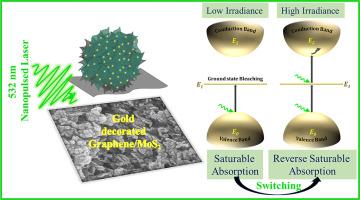Localized surface plasmon resonance induced nonlinear absorption and optical limiting activity of gold decorated graphene/MoS2 hybrid
IF 3.1
Q2 MATERIALS SCIENCE, MULTIDISCIPLINARY
引用次数: 0
Abstract
The synergistic supremacy of a hybrid nanocomposite made of reduced graphene oxide (rGO), molybdenum disulfide (MoS2) and gold nanoparticles (Au) for Q-switching and optical limiting applications is investigated. Hydrothermally synthesized Au-rGO-MoS2 hybrid with varying concentrations of Au (2.5, 5, 7.5 and 10 wt%) was subjected to interact with Q-switched Nd:YAG nanosecond green laser pulses. The intensity dependent nonlinear absorption studies revealed a switch over in the nonlinear behaviour from saturable absorption (SA) to reverse saturable absorption (RSA) behaviour. SA occurs due to ground state bleaching at comparatively lower laser irradiances serving the need for Q-switching and optical communications. The RSA trait at higher laser irradiance is attributed to sequential two-photon absorption which serves as the platform for optical limiting behaviour prompting laser safety and effective photothermal therapy applications. The strong mid-visible and UV absorption promotes the availability of multiple energy bands for energy transitions of excited state absorption (ESA). Enhanced local fields due to localized surface plasmon resonance effect, structural defects, hierarchical morphology, increased absorption cross-section and plasmon induced energy transfer promotes robust ESA process. These tunable nonlinear optical properties make Au-rGO-MoS2 hybrid promising futuristic candidates for applications in nonlinear photonic devices, ultrafast optical switches and all-optical signal processing systems.

金装饰石墨烯/MoS2 杂化物的局部表面等离子体共振诱导非线性吸收和光学极限活性
本研究探讨了还原氧化石墨烯(rGO)、二硫化钼(MoS2)和金纳米粒子(Au)混合纳米复合材料在 Q 开关和光学限制应用中的协同优势。水热合成的 Au-rGO-MoS2 杂化物含有不同浓度的 Au(2.5、5、7.5 和 10 wt%),与 Q 开关 Nd:YAG 纳秒绿色激光脉冲相互作用。与强度相关的非线性吸收研究表明,非线性行为从可饱和吸收(SA)转换为反向可饱和吸收(RSA)行为。在相对较低的激光辐照度下,由于基态漂白,会产生可饱和吸收,从而满足 Q 开关和光通信的需要。较高激光辐照度下的 RSA 特性则归因于连续的双光子吸收,它是光限制行为的平台,可促进激光安全和有效的光热治疗应用。强烈的中可见光和紫外线吸收促进了激发态吸收(ESA)能量转换的多能带可用性。由于局部表面等离子体共振效应、结构缺陷、分层形貌、吸收截面增大以及等离子体诱导的能量转移,增强了局部场,从而促进了稳健的 ESA 过程。这些可调谐的非线性光学特性使得 Au-rGO-MoS2 混合材料在非线性光子器件、超快光开关和全光信号处理系统中的应用前景广阔。
本文章由计算机程序翻译,如有差异,请以英文原文为准。
求助全文
约1分钟内获得全文
求助全文
来源期刊

Carbon Trends
Materials Science-Materials Science (miscellaneous)
CiteScore
4.60
自引率
0.00%
发文量
88
审稿时长
77 days
 求助内容:
求助内容: 应助结果提醒方式:
应助结果提醒方式:


